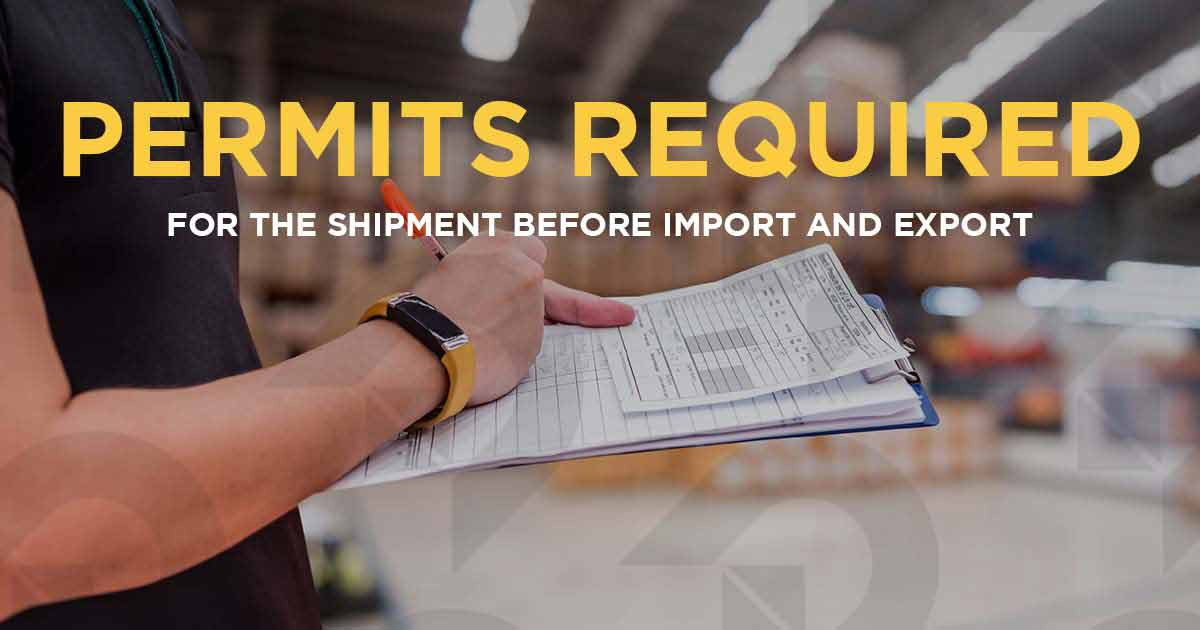
The Most Crucial Licenses Needed for Your items before exporting or Importing – Get Started Now!
Don't let your items get stuck at borders - make sure you have the necessary licenses before importing and exporting. Learn which licenses are most important and how to obtain them quickly and easily, and some common reasons for permit or license rejections. Get your items moving with the right paperwork!
Some of the permits or licenses that may be required for a shipment:
The permits or licenses required for a shipment will depend on the type of goods being shipped and the country of import or export. Here are some examples of permits or licenses that may be required:
- Import or export licenses: Some countries may require an import or export license for certain goods. This license is issued by the government and allows the goods to be legally imported or exported.
- Certificate of Origin: A document that specifies the origin of the goods being sent and may be required for customs clearance by the importing country. One of the key documents on which tariff assessment is based on country of origin, taking into account, certificates of origin for the Trade Agreement and economic or commercial conglomerates.
- Phytosanitary certificates: These certificates are required for the shipment of agricultural products and are issued by the relevant government agency to certify that the products are free from pests and diseases.
- Health certificates: Health certificates may be required for the shipment of food products or live animals, to certify that they meet the health requirements of the importing country.
- End-user certificates: End-user certificates may be required for the export of certain goods, such as military equipment or sensitive technology. These certificates certify that the goods will be used for the intended purpose and will not be diverted to unauthorized recipients.
- Permits for hazardous materials: Hazardous materials such as chemicals, explosives, or radioactive materials require permits or licenses for their safe transportation.
- Intellectual property licenses: If the shipment includes products that are protected by intellectual property rights, such as patents or trademarks, a license may be required to use or distribute them.
- Export controls: Some goods, such as military equipment or certain technologies, are subject to export controls and may require a license or approval from the relevant government agency.
It is important to check with the relevant government agencies or customs officials to determine the specific permits or licenses required for your shipment, to avoid delays and additional costs.
How to obtain these permits and licenses?
The process of obtaining permits and licenses for a shipment will depend on the type of goods being shipped and the country of import or export. Here are some general steps you can take to obtain the necessary permits and licenses:
- Determine the requirements: Research the requirements for your shipment, including any permits or licenses that may be required. You can check with the relevant government agencies, customs officials, or freight forwarders for information on the specific requirements.
- Prepare the necessary documentation: Once you have determined the requirements, prepare the necessary documentation, such as application forms, certificates, and supporting documents. Make sure that the documentation is accurate and complete.
- Submit the application: Submit the application for the permits or licenses to the relevant government agency or customs officials. You may be required to pay a fee for the permits or licenses.
- Wait for approval: The processing time for the permits or licenses will vary depending on the type of permit and the country of import or export. Some permits or licenses may be processed quickly, while others may take several weeks or even months.
- Receive the permits or licenses: Once the permits or licenses are approved, they will be issued to you. Make sure to keep the permits or licenses with your shipment documents to avoid any issues during customs clearance.
It is important to start the process of obtaining permits and licenses well in advance of your shipment, to ensure that you have enough time to obtain them and avoid any delays in customs clearance. It is also a good idea to work with a freight forwarder or customs broker who can assist you with the process and provide guidance on the specific requirements for your shipment.
Some common reasons for permit or license rejections:
There are several reasons why a permit or license for a shipment may be rejected. Here are some common reasons:
- Incomplete or inaccurate documentation: If the application or supporting documentation for the permit or license is incomplete or inaccurate, it may be rejected. Make sure to carefully review the requirements and provide all the necessary information.
- Non-compliance with regulations: If the shipment does not comply with the regulations or standards for the country of import or export, the permit or license may be rejected. This can include issues such as safety, health, environmental, or intellectual property regulations.
- Failure to meet criteria: Some permits or licenses have specific criteria that must be met, such as a minimum quantity or quality of goods, or a specific certification or accreditation. If these criteria are not met, the permit or license may be rejected.
- Security concerns: If the shipment raises security concerns, such as the shipment of hazardous materials or sensitive technology, the permit or license may be rejected.
- Political or trade issues: Sometimes, permit or license rejections can be due to political or trade issues between countries. This can include issues such as embargoes, sanctions, or trade disputes.
If your permit or license is rejected, you may be able to appeal the decision or reapply with additional documentation or information. It is important to work with the relevant government agencies or customs officials to understand the reasons for the rejection and take the necessary steps to address them.




